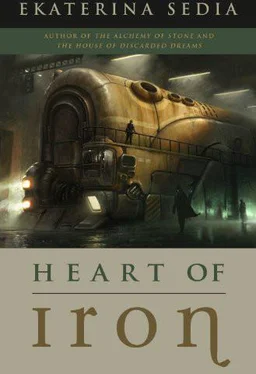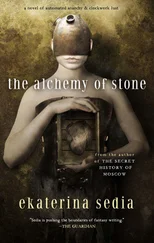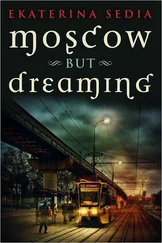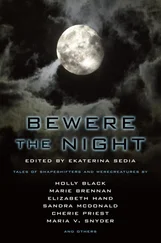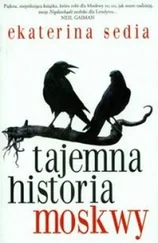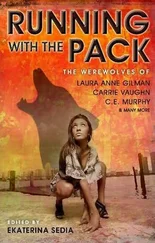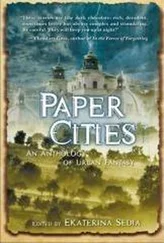“Wait,” Chiang Tse repeated, this time looking directly at Jack. “No sense in killing yourself in a pointless task.”
Jack, crouched down with the force of his landing, looked up, and straightened, slow and deliberate. “Pointless?”
“Jack, I think Chiang Tse means that Kuan Yu is flying the ship.”
“He seems to be doing a fine job,” Aunt Eugenia said.
“Kuan Yu? Our friend from the train?” Jack asked, confused. “I knew he was no ordinary fur trader, but surely he is not an engineer?”
“He isn’t.” I knew my satisfied expression befuddled Jack all the more, but I just could not contain my desire to tease him a little — after all, he did sent me on a chase after him.
The ship was now a mere gold coin against the sky, gaining distance. I strained my eyes until I saw a black speck, so small that I was not entirely sure I had seen it, detach from the ship and fall toward the Earth. “Look!” I called to Chaing Tse, pointing at the falling dot.
He smiled. “It is rare to find an ally who knows what you need him to do without ever asking. I would be a liar if I said I was not pleased with his admirable abilities.”
Despite the distance, as the speck approached the ground, I could see it was shaped like a tulip — or a man with a substantial amount of fabric spread above and around him, bracing and slowing his fall. “What of the ship?” I said.
Aunt Eugenia sighed. “Remember Tosno?”
I nodded, mute. The ship was so beautiful — it was beautiful still as it faltered and grew larger as it descended, as its wings hung limp. The steam no longer escaped from it, and I could only imagine the terror of the people trapped inside it — or rather, I tried not to. The golden ship wobbled one last time, and then plummeted somewhere into fields hidden from view by a narrow copse of bare aspens. Only a brief flash against the slowly darkening sky signaled its demise.
I turned to Jack. “I suppose you have your revenge.”
He shrugged. “It’s not proper revenge if you do not complete it yourself.”
“At least this way you survived. I’m glad you have.”
He nodded, looking unconvinced.
We shivered and waited for Kuan Yu to join us.
Almost a year has passed since we got back to St. Petersburg. It is winter again, and I cannot wait until May when I can go back to Trubetskoye. I am a little upset that I have to repeat the first two quarters, but the work is easily accomplished the second time around.
I also find it comforting that Chiang Tse has been allowed to finish his education. He was granted leave from his gubernatorial post and now performs some diplomatic duties for the new Chinese ambassador to the imperial court — but not enough to interfere with his studies. The Crane Club is still gone, but now that the English have left the Northern Star, we’ve made it a favorite spot to get together and listen to the mechanical pianist.
Wong Jun was released from the Ravelin, but decided to stay in St. Petersburg — being a Manchu is now a precarious proposition in Beijing. He seems content to come to classes every now and again between bouts of complaining and dark moods. He claims to find some comfort in writing poetry, but he never allows the other Chinese students to read it.
And then there is Jack. He also attends the university and takes classes; he still walks me home every now and again. As for our adventure, we speak little of it. He has expressed regret over the poor horse, and the fright he gave the garrison. I have imparted some of Volzhenko’s theology and told him of the Aardvarks. The subject of my illfated letter is never mentioned between us, but the knowledge of it hangs over us. We both know I do not return his feelings, just as we both know he has not yet abandoned hope that someday I will. He seldom speaks to Chiang Tse, but both are polite and do not seem to wish ill to one another.
Jack seems concerned about the English expulsion, and makes occasionally vague predictions about the Secret Service traveling to Mongolia to make connections with the Qing Dynasty, but I think he worries a little prematurely. As Eugenia says, no point in planning for winter when you don’t know if you’ll live through the summer.
Eugenia remains at Trubetskoye to keep my mother company and to make sure the family estate runs as smoothly as could be desired. All summer, the two were the same as always, and I expect to find them so when I visit Trubetskoye at winter recess; I do not expect people their age to change. I would not want them to, for the world grows less familiar with every day, and one needs to have a steady constant flame of familiarity one can return to when the dragon airships are gone and the reverse corsets are packed away in oak chests. Any adventure must give away to familiarity of routine, and I look to what lies ahead of me, clear eyed and level headed, knowing that both changes and constancy have their place in the world, and that I can survive either.
I gratefully acknowledge love and support of my family, without whom this book would not be possible. I am forever grateful to Jennifer Jackson, my tireless agent, who provided feedback throughout, and worked diligently on finding this book a home. I thank Paula Guran, my editor, for all her hard work in making this a much more coherent book; and of course I am thankful to Sean Wallace, who continues to believe in my work. Many thanks go to Marcin Jakubowski for his art, and to Stephen Segal for his always expert design ideas.
I am grateful to my first readers — Amy Lau, Beth Bernobich, John Glover, Justin Howe, Leah Bobet, Michael Curry — for their thoughtful feedback, and for helping make it a better book. I am especially grateful to Genevieve Valentine who was there to offer her friendship, advice and encouragement from the very beginning of this project.
